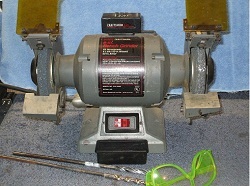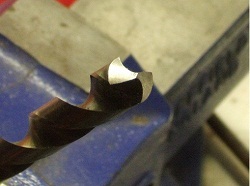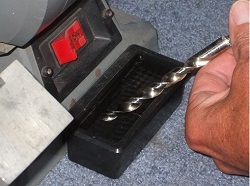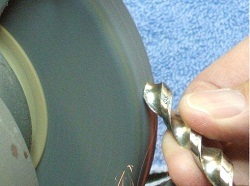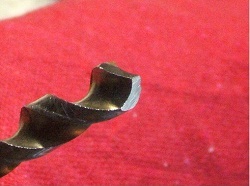- Home
- Compare Systems
- Cheap Systems
- Free Quotes
- DIY Systems
- Hardwired Systems
- Wireless Systems
- Smoke Detectors
- Medical Alarms
- Alarm Monitoring
- Cameras & Video
- Ademco
- ADT Security
- Brinks Security
- Broadview
- DSC Security
- FBI Alarms
- GE Security
- Honeywell
- Link Interactive
- Monitronics
- Moose
- Napco
- Protection 1
- Radionics
- Simplisafe
- Alarm Manuals
- Alarm System Parts
- Alarm Tools
- Troubleshooting
- FAQ
- Glossary
- Sitemap
- About Me
- Contact Me
The Best Ways to Sharpen Drill Bits
Learning several ways to sharpen drill bits will keep you from having to buy expensive replacement twist drill bits. You can also breath new life into those dull bits that don’t work well, but that you just can’t bear to throw away!
Here are the best techniques I’ve found for drill bit sharpening, along with some pros and cons for choosing each method.
Bench Grinder Method
One of the fastest ways to sharpen drill bits is by using a standard bench grinder.
Pros:
If you’re an avid do-it-yourselfer, you may already have a garage workshop with a bench grinder. Nothing new to buy!
There is very little set-up time when using a grinder for sharpening
drill bits. Just put on eye protection, turn the machine on, and start
sharpening.
A bench grinder can also be used for scissors, lawnmower blade
sharpening, and putting a sharp edge on other garden tools. It also will
work for sharpening large drill bits, which many off-the-shelf tools
won’t handle.
Grinding wheels last a long time with light use, so you’ll never have to look for a replacement sharpening stone as with some of the dedicated sharpening tools.
A bench grinder is easily one of the best ways to sharpen drill bits
that are very worn, or even broken. If you drill through lots of
hardwood or metal, or if you often hit masonry or nails with your twist
drill bits, a grinder will put an edge back on them, fast.
Most bench grinders come with two sharpening wheels, one coarse and one
fine. You can do the bulk of the sharpening quickly using the coarse
wheel. Then, move over to the fine wheel to put the finishing touches to
the drill point.
As you sharpen drill bits, a bench grinder makes it easy for you to dip
the points briefly in water. This keeps the bit cool when removing large
amounts of metal from very dull or broken drill bits.
Cons:
There is a learning curve to hand sharpen drill bits, and it may take some practice.
Free hand grinding isn't as accurate as some other ways to sharpen drill
bits. It's definitely not as precise as a dedicated sharpening tool, so
it’s not the best method for bits used for precision drilling of
valuable woods or metals. It is, however, good enough for alarm
drilling!
Hand sharpening isn’t for everybody. If you’re not comfortable having your fingers near a rapidly spinning grinding stone, then consider investing in one of the commercial sharpening tools.
For more details, pictures, and step-by-step instructions, see “How to Sharpen Drill Bits Using a Bench Grinder”.
Drill Doctor Drill Bit Sharpener
The most accurate ways to sharpen drill bits involve using a dedicated tool of some kind.
The Drill Doctor drill bit sharpener is a little pricey, but will give good results. Here are some of the pluses and minuses for choosing the Drill Doctor.
Pros:
A good choice if you don’t have access to a bench grinder.
The Drill Doctor offers precision sharpening that gives a symmetrical
point to drill bits. This makes them good for precise drilling on fancy
wood or metal, as well as any alarm pre-wiring and drilling chores.
The sharpening stone is replaceable, so if you use it a lot you can keep a spare on hand.
Cons:
Fairly expensive, advanced models with extra features cost over $100.
The basic Drill Doctor is a uni-tasker, unless you spend more for a
combination unit which can also be used for scissors, knife sharpening,
etc.
Very dull bits can take a while to sharpen. Most commercial sharpening tools have fairly fine stones, which do give a smooth edge. This also means they don’t remove metal very fast, so blunt bits can get tedious.
Drill bits can’t easily be dipped in water for cooling as you sharpen, so they may heat up. This can leave you with a less durable drill bit point if you try to sharpen bits too fast.
Drill-Powered Bit Sharpening Tool
One of the cheapest ways to sharpen drill bits, a drill-powered drill bit sharpener can create nice drill points. These cost much less than some other dedicated drill bit sharpening tools, but may take a little care to use. The Tormek bit sharpener shown here costs around $20, and is available everywhere on line.
Pros:
Very inexpensive, but can give results nearly as good as the more expensive Drill Doctor.
Little set-up time.
Portable, small, and fairly easy to use while away from the workbench.
Depending on the design, you may be able to dip the bit in water, or wet it with a spray bottle to cool it as you sharpen. This will give your drill bits an edge that stays sharper, and lasts longer.
Cons:
Some can be a bit tedious to use, since the drill bit must be correctly positioned and held firmly for best sharpening results.
Many ready-made bit sharpeners of this kind are limited in the size of bit they will handle, usually up to ½” diameter.
The sharpening wheels in most of these types of bit sharpeners aren’t
replaceable. Then again, the whole tool can be replaced for about the
same price as a Drill Doctor replacement wheel.
Like the Drill Doctor, the sharpening stone in most drill-powered
sharpeners is relatively fine. This means it will take longer to put a
good edge back on well-worn bits.
Diamond Files
Sharpening drill bits without electrical power.
Unlike every method discussed above, diamond files require no AC or battery power, just old-fashioned elbow grease!
Wood-boring bits with an auger or pilot screw must be sharpened differently than most other bits.
One of the only practical ways to sharpen drill bits having a
pilot screw is with a diamond needle file. Hand filing is much slower
than the power tools used for standard twist drill bits, but it’s
necessary to avoid damaging the pilot screw at the point of the bit.
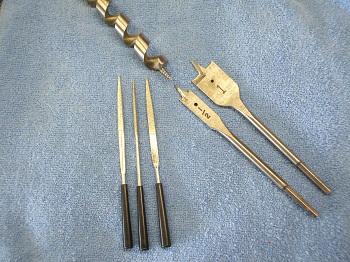
By the way, diamond files work very well for sharpening any type
of drill bit in a pinch. They are quite cheap, at less than $10 for an
assortment from Harbor Freight Tools. And, they can save you time and
effort when you’re away from your usual power tools and electricity.
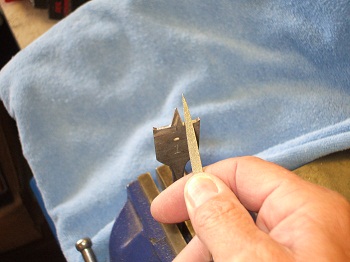
Knowing how to sharpen drill bits will save you time,
money, and effort in any drilling chore. Drill bits are too expensive
to waste, and resharpened drill bits allow you use a fresh, sharp bit
anytime you start a project.
For tips on how to use your freshly sharpened bits, see these pages:
Using a Flexible Drill Bit the Right Way
Using Long Drill Bits for Alarm Wiring in Doors
Return to Home-Security-Systems-Answers from The Best Ways to Sharpen Drill Bits
Return to DIY Home Security Systems from The Best Ways to Sharpen Drill Bits
Note: Feel free to print any of the articles on this site for personal, non-commercial use. Just look for this button:
If you found this website especially helpful, you might want to consider making a small donation. Since 2011, AzAlarmGuy has been providing free help and advice on home security systems to all of those in need.
Your gift, in any amount, will help me keep this website a free resource for anyone needing help with alarm system issues or questions.
Disclosure
I receive affiliate commissions from some of the companies and products I discuss. These commissions don't change the price that you pay.
Rest assured that this compensation does not influence my recommendations. I only endorse products and services that I truly believe to be an honest value for you, as a visitor to my site.
For more details, see my full disclaimer.
